

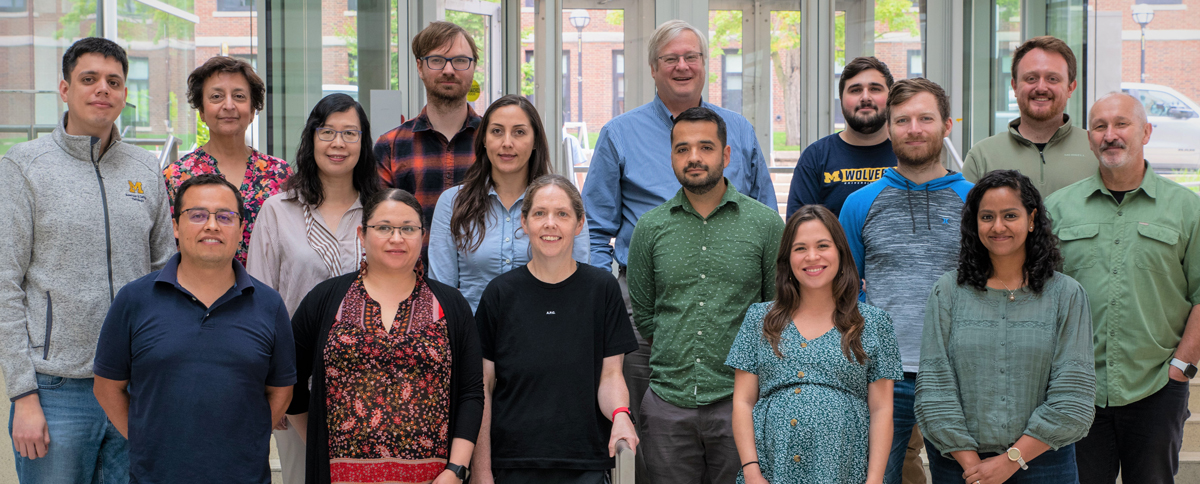

F. Peyton Rous Professor, Mucosal Inflammation and Epithelial Pathobiology; Director of Experimental Pathology
anusrat [at] med.umich.edu
Short Bio Education Administrative Appointments NCBI
Dr. Nusrat’s research has focused on investigating mechanisms that orchestrate epithelial barrier regulation, mucosal homeostasis and repair in inflammatory disorders. Epithelial barrier function is achieved by a series of intercellular junctions that include an apical tight junction, subjacent adherens junction and desmosomes. We are exploring molecular mechanisms by which inflammatory mediators alter intercellular junction protein complexes and epithelial barrier function. In addition, ongoing studies are elucidating the influence of inflammatory and pro-resolution mediator signaling on epithelial homeostasis, wound repair and restoration of barrier function. Signaling down-stream of G-protein coupled receptors including formyl peptide receptors in response to protein and lipid pro-resolution ligands that coordinate intestinal mucosal wound repair are being investigated.
Education
MD, University of Punjab (1982)
Residency, Brigham and Women’s Hospital, Boston, MA (1987-1989)
Postdoctoral Fellow, Brigham and Women’s Hospital, Boston, MA (1989-1992)
Administrative Appointments
Instructor of Pathology, Harvard Medical School, Boston, MA (1992-1996)
Staff Pathologist, Brigham and Women’s Hospital, Boston, MA (1992-1997)
Staff Consultant, Gastrointestinal Pathology, Children’s Hospital, Boston, MA (1993-1996)
Assistant Professor of Pathology, Harvard Medical School, Boston, MA (1996-1997)
Assistant Professor of Pathology, Emory University, Atlanta, GA (1997-2003)
Associate Professor of Pathology (Tenure), Emory University, Atlanta, GA (2003-2007)
Professor of Pathology and Cell Biology (Tenure), Emory University, Atlanta, GA (2007-2015)
AS Warthin Professor (Tenure) and Director of Experimental Pathology, University of Michigan (2015-present)
Funding Sources
P.I., NIH, “Intestinal epithelial tight junction structure function”, RO1-DK59888
P.I., NIH, “Intestinal mucosal wound resealing in IBD”, RO1-DK055679
Co.I., NIH “Forml peptide receptors as mediators of intestinal mucosal homeostasis”, RO1-DK089763
Co-P.I., DoD, “CLMP-mediated regulation of intestinal homeostasis in IBD”, PRMP

Carl V. Weller Professor and Chair, Mucosal Inflammation and Epithelial Pathobiology
cparkos [at] med.umich.edu
Short Bio Education Administrative Appointments NCBI
Dr. Parkos’ research interests focus on basic mechanisms of epithelial-immune cell interactions and the impact on mucosal homeostasis. Using in-vitro and in-vivo approaches, the lab is studying the molecular basis of leukocyte migration across mucosal epithelia as well as the impact of inflammation on epithelial barrier function as observed in pathologic conditions such as ulcerative colitis and Crohn’s disease. Dr. Parkos and his team have elucidated the roles of many epithelial and neutrophil proteins in regulating leukocyte trafficking across the intestinal mucosa that include adhesion/signaling molecules such as CD11b/CD18, CD47, SIRPalpha, junctional adhesion molecules (JAMs), and cell surface glycans. Recent studies by the group have provided important insights into fundamental mechanisms of how these receptors regulate mucosal homeostasis during health and disease. Current projects in the laboratory are using complementary in-vitro and in-vivo approaches to examine the role of JAM family members in the regulation of epithelial barrier and leukocyte migration, characterizing the signaling events that occur between leukocytes and epithelial cells that serve to control leukocyte transmigration and epithelial permeability, and elucidating the structural basis of protein interactions that regulate these responses.
Education
BA, University of California - San Diego (1979)
PhD, University of California - San Diego/Scripps Clinic and Research Foundation (1987)
MD, University of California - San Diego (1987)
Pathology Residency, Brigham and Women’s Hospital, Boston, MA 1988-1991
Administrative Appointments
Assistant Professor, Department of Pathology, Harvard Medical School, Boston, MA (1992-1997)
Associate Professor, Department of Pathology, Emory University School of Medicine, Atlanta, GA (1997-2003)
Professor, Department of Pathology, Emory University School of Medicine, Atlanta, GA (2003-2014)
Director, Emory University MD/PhD training Program (2007-2014)
Vice Chair, Department of Pathology, Emory University School of Medicine, Atlanta, GA (2008-2014)
Carl V. Weller Professor and Chair, Department of Pathology, University of Michigan Medical School, Ann Arbor, MI (2014-present)
Funding Sources
P.I., NIH, “Neutrophil interactions with intestinal epithelium,” RO1-DK72564.
P.I., NIH, "Structure function studies on intestinal epithelial JAM" R01-DK61379.
P.I., NIH, "Intestinal Inflammation: Signaling proteins and the rate of PMN transmigration" R01-DK079392.
Co-P.I., DoD, “CLMP-mediated regulation of intestinal homeostasis in IBD”, PRMP

Research Assistant Professor
brazilj [at] med.umich.edu
Dr. Brazil has a PhD in Medicine and Molecular Science, having completed a doctoral dissertation at the Conway Institute of Biomolecular Medicine in University College Dublin, Ireland studying the dynamic neutrophilic response to inflammatory stimuli. In 2008, she joined the lab of Dr. Nancy Louis as a Postdoctoral Fellow in the pathobiology group at the Department of Pediatrics at Emory University in Atlanta, Georgia. During this initial postdoctoral period, Dr. Brazil characterized the GM35 antibody and its attenuation of neutrophil transepithelial migration through binding to the carbohydrate structure sialyl Lewis A on epithelial CD44v6 (see publications link below). Because of the relevance of her work to inflammation associated mucosal tissue damage, in 2012, Dr. Brazil was awarded a research fellowship award from the Crohn’s and Colitis Foundation of America (CCFA) and in 2014 she was successful in her application for a career development award from the same funding agency. In 2014, Dr. Brazil joined the Parkos lab in the Department of Pathology, Emory University as a Research Associate and subsequently accepted a junior faculty position as a Research Investigator in the Department of Pathology at the University of Michigan. Most recently, Dr. Brazil’s work has focused on characterizing the role of PMN expressed Lewis glycans during neutrophil transepithelial migration and during neutrophil function in inflamed intestinal mucosa.
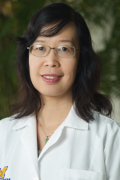
Research Lab Specialist Senior
shulingf [at] med.umich.edu
Dr. Shuling Fan is an Assistant Research Scientist at the University of Michigan. Dr. Shuling Fan earned her MD degree from Medical College of Fudan University in Shanghai, China. Prior to her appointment at the University of Michigan, she practiced medicine (nephrology) in China for 10 years. Her research interests focus on molecular mechanisms of regulating epithelial tight junction assembling and signaling. She is currently working on the phosphorylation of JAM-A, a key barrier molecule for intestinal epithelial cells in regulating intestinal barrier function, and its functional roles in IBD.

Research Lab Specialist Senior
vgarciah [at] umich.edu
Dr. Vicky Garcia-Hernandez received her PhD degree in Cellular and Molecular Physiology from the Center for Research and Advanced Studies of the National Polytechnic Institute (CINVESTAV, Mexico) where she studied the regulation of claudins in the epithelia and she was an instructor in the National Polytechnic Institute (IPN) in Mexico City. Dr. Garcia-Hernandez is currently the lab manager and a Research Lab Specialist in the Parkos and Nusrat group. Her professional interests focus on the epithelia function and regulation, cellular signaling and physiopathology during inflammatory conditions. Her current projects include: A) role of stem cell factor (SCF) in regulation of intestinal mucosal homeostasis and repair after inflammation, and B) regulation of intercellular junctional proteins in the context of epithelial biology, barrier function and pathogenesis of mucosal inflammation in the gut.
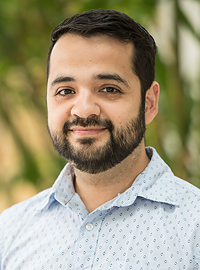
Research Assistant Professor
mquirosq [at] umich.edu
Dr. Miguel Quiros did his undergrad studies in microbiology at the University of Costa Rica. He obtained his PhD in Molecular and Cellular Physiology at the Center for Research and Advanced Studies in Mexico City, Mexico. During his PhD he specialized in epithelial cell junctions and their physiological regulation. His research focuses on the resolution phase of intestinal inflammation. His current projects include: (a) establishing a defined matrix to grow mini-guts with the potential to be engrafted into ulcerated tissue from IBD patients and promote epithelial recovery; (b) characterizing the kinetics of cytokine release during the resolution phase of inflammation and describe the cascade of events that lead to recovery of homeostasis; (c) studying the effect of specialized pro-resolution mediators on intestinal epithelial wound healing. He is a member of the American Society of Investigative Pathology where he has been recognized with multiple travel awards to attend scientific meetings to present his work. Dr. Quiros also has a Crohn’s and Colitis Foundation of America (CCFA) research fellowship award and was awarded with the CCFA 2016 Shanti Sitaraman, MD, PhD, Young IBD Investigator Award for his research on the role of Resolvin E1 on intestinal epithelial wound healing.
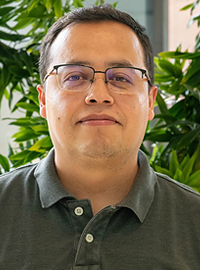
Research Investigator
jrayasan [at] umich.edu
Dr. Arturo Raya-Sandino is interested in understanding how the intestinal epithelium controls barrier function and the mechanisms by which intestinal inflammation compromises barrier function in inflammatory bowel disease (IBD). He did his undergraduate studies in Chemist, Pharmacist, and Biology at the National Autonomous University of Mexico (UNAM). He received the “Jacobo Gómez Lara” award for his bachelor thesis entitled “Biochemical characterization of the glucose transport in embryonic corn tissue”. Arturo received an MSc from the Department of Physiology, Biophysics, and Neuroscience at the Center for Research and Advanced Studies (Cinvestav, Mexico) under the mentorship of Dr. Lorenza González-Mariscal and won the “2013 Langebio award” of the National Laboratory of Genomics for Biodiversity (LANGEBIO) at the Cinvestav-Irapuato as co-author of the work “The cytokine response of U937-derived macrophages infected through antibody-dependent enhancement (ADE) of dengue virus disrupts cell apical junctional complexes and increases vascular permeability”. His Ph.D. studies were done in the laboratory of Dr. Lorenza González-Mariscal, where he found that the TJ protein ZO-2, a TJ scaffold protein, is a crucial regulator of cytoarchitecture and barrier function in epithelial cells by regulating Rho GTPase activity. Arturo’s doctoral thesis was awarded the “2019 Weizmann Prize” in Biological Sciences from the Mexican Academy of Sciences and the Mexican Association of Friends of the Weizmann Institute of Science. Dr. Raya-Sandino joined the lab of M.D. Asma Nusrat and Dr. Charles Parkos in the Department of Pathology at the University of Michigan as a Postdoctoral Fellow in 2018. He was awarded a research fellowship from the Crohn’s and Colitis Foundation of America (CCFA). Arturo accepted a Research Investigator faculty position and obtained a career development award from the CCFA in 2022. Dr. Raya-Sandino’s work is focused on the participation of the claudin-23, an integral tight junction (TJ) protein, in intestinal epithelial physiology under physiological and pathological conditions.
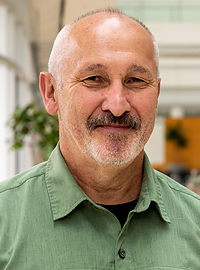
Research Lab Specialist Senior
sstoll [at] umich.edu
Dr. Stoll is a Senior Research Lab Specialist in the Department of Pathology at the University of Michigan. He received his Diploma (M.Sc.) degree in biology and Dr. rer. nat. (Ph.D.) in genetics from the Eberhard Karls University in Tübingen, Germany. He has extensive experience in cellular and molecular biology and a long-standing interest in studying the signaling mechanisms that regulate migration, proliferation, and differentiation of epithelial cells. Dr. Stoll has been the recipient of multiple awards including a NIH Research Career Development Award.
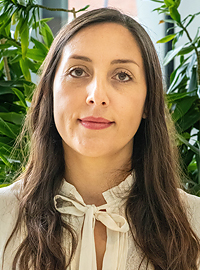
Postdoctoral Research Fellow
jaelmi [at] umich.edu
Dr. Jael Miranda-Guzman received her Ph.D. degree in Cellular and Molecular Physiology from the Center for Research and Advanced Studies (Cinvestav) in Mexico City, Mexico, where she studied the tight junctions of epithelial (blood-placental barrier) and endothelial (blood-brain barrier) barriers under inflammatory conditions induced by Zika and Dengue virus infection, respectively. She earned her M.S. degree in Infectomics and Molecular Pathogenesis from Cinvestav studying the Dengue virus entry into human macrophages. Her research interests are centered on the roles of cytokines and specialized pro-resolving mediators on the resolution phase of intestinal inflammation and mucosal barrier repair.
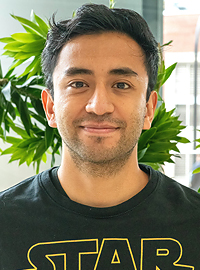
Postdoctoral Research Fellow
marmando [at] umich.edu
Dr. Armando Montoya-Garcia obtained his MS and PhD degrees in Molecular Biomedicine at the Center for Research and Advances Studies of the National Polytechnique Institute (CINVESTAV-IPN) in Mexico City. During his tenure at CINVESTAV-IPN, he conducted research in the laboratory of Dr. Michael Schnoor, where his work focused on unraveling the role of the Arp2/3 inhibitory protein arpin in regulating endothelial permeability and neutrophil transmigration. Following this, he joined the Parkos-Nusrat group at the University of Michigan as a Postdoctoral research fellow. Currently, Dr. Montoya-Garcia is engaged in researching the regulation of tight junctions of the epithelial barrier and leukocyte transepithelial migration in the context of inflammatory bowel disease (IBD).

Postdoctoral Research Fellow
pasandhy [at] umich.edu
Dr. Sandhya Padmanabhan received her Ph.D. degree in Translational Biomedical Sciences from Georgia State University. During her Ph.D, Sandhya worked in the lab of Dr. Cynthia Nau Cornelissen on the molecular mechanisms of gene regulation in the bacterial pathogen Neisseria gonorrhoeae. Her dissertation work focused on characterizing regulation of vaccine candidate genes towards the development of a reporter, to visualize differences in zinc and iron availability in male and female reproductive milieu, during a gonococcal infection. Sandhya joined the Parkos and Nusrat Lab in 2024, in the Department of Pathology, as a Postdoctoral Research Fellow. Currently, her research interest lies in understanding and investigating the mechanisms of intestinal epithelial barrier regulation and repair during mucosal wound healing and inflammation as related to inflammatory bowel disease (IBD).
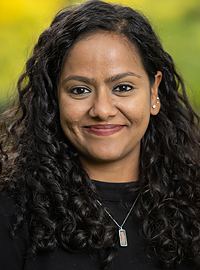
Postdoctoral Research Fellow
varadars [at] umich.edu
Dr. Saranyaraajan Varadarajan received her Ph.D. in Molecular, Cellular, and Developmental Biology at the University of Michigan, Ann Arbor. Sara’s predoctoral work in Dr. Ann Miller’s lab focused on the role of mechanosensitive calcium signaling in regulation of epithelial barrier function in developing Xenopus laevis epithelium. In 2021, she joined Nusrat-Parkos lab at the Department of Pathology as a Postdoctoral research fellow. Currently, her research interests include the mechanisms by which intestinal epithelial cells and immune cells, migrate and proliferate to restore tight junction barrier during mucosal wound healing in pathological conditions like Inflammatory Bowel Disease (IBD). Her interests outside of lab include traveling, coffee, Yoga, Zumba, gardening, and hiking.
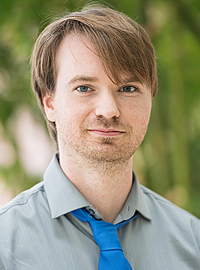
Postdoctoral Research Fellow
wilsonza [at] umich.edu
Dr. Zachary Wilson received his PhD in Pathobiology at Brown University in Rhode Island, studying neutrophil adhesion, motility and mechanosensing. Dr. Wilson has a strong interest in innate immunology and the associated inflammatory diseases that burden healthcare. In 2019, he joined the Parkos & Nusrat lab at the University of Michigan as a postdoctoral fellow. Currently, he is interested in the mechanisms of leukocyte transepithelial migration to better understand how immune cells are recruited during inflammatory bowel disease (IBD).

Graduate Student
lozadaso [at] med.umich.edu
Kristen is an MD PhD student with a profound interest in the cellular and molecular mechanisms that govern intestinal mucosal tissue homeostasis, and how these mechanisms are perturbed under inflammatory conditions. She is pursuing her graduate studies in the Molecular and Cellular Pathology PhD Program. Kristen graduated from the University of Puerto Rico at Rio Piedras with a Bachelor of Science degree in Biology. As an undergraduate, her research focused on understanding epigenetic factors that contribute to colorectal carcinogenesis in Puerto Rican patients. Upon graduation, she pursued research at Case Western Reserve University where she conducted an independent project studying inflammasome-mediated cell death signaling pathways in crystal-accumulating inflammatory diseases, such as gout and atherosclerosis. Currently, Kristen focuses her studies on the regulation of the tight junction proteins in the intestinal epithelium and their role in Inflammatory Bowel Disease (IBD) pathology.
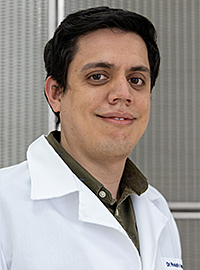
Graduate Student
ricsilva [at] med.umich.edu
Ismael is a student in the Molecular and Cellular Pathology Ph.D. program with the main interest in the alterations of the intestinal mucosal present during chronic inflammation. Ismael graduated with an MBBS from the University of Guadalajara. During his undergraduate, Ismael studied the relevance of Cortactin in the induction of Sepsis. Afterward, Ismael obtained his M.Sc. degree in Immunology from King’s College London by researching the immune phenotype of the immune checkpoint inhibitors-induced colitis and its similarities with Inflammatory Bowel Disease (IBD). Culminating his M.Sc., he worked at the Research Institute in Immunodeficiencies and HIV at the University of Guadalajara by understanding the impact of chronic HIV infection on the induction and severity of comorbidities.

Research Lab Tech Assoc.
aguilary [at] umich.edu
Yelitzza Aguilar received a Bachelor of Science degree from University of Michigan in Microbiology. As an undergrad, Yelitzza worked as a Trainer teaching students post-surgery care in the Extracorporeal Life Support Lab for three years contributing to the research of improving implantable lung devices, prolonging extracorporeal circulation, and improving artificial placenta for premature births. Participated in the Undergraduate Research Opportunity Program and joined Dr. Peter X. Ma lab as a temporary research student focusing on cardiovascular disease and discovering a method to prevent and modulate the effects by finding alternative sources of readily available grafts. Yelitzza joined Dr. Catherine Collin's lab as a Research Lab Assistant researching the regulation and function of dual leucine zipper kinase (DLK) and how DLK is stimulated by a range of neuronal stress, primarily focusing on excitotoxicity. After graduating, Yelitzza continued working with Dr. Collins as a Research Lab Technician Intermediate. She is currently working in the Parkos and Nusrat lab on genotyping and general lab maintenance. Yelitzza plans on applying to pathology assistant programs in the future.
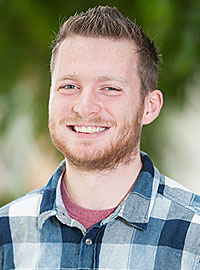
Research Lab Specialist Associate
dyfink [at] umich.edu
Dylan Fink received a Bachelor of Science degree from the University of Michigan in Ecology and Evolutionary Biology and Molecular, Cellular and Developmental Biology. While completing his undergraduate degree Dylan worked for 4 years under Dr. Zia Shao in the department of Radiology assisting with research projects including focusing on a project developing gold nanoparticle and studying their applications for targeting of different tissues. Dylan now manages cell culture for the Parkos and Nusrat labs in addition to assisting with projects studying wound healing in the gut, neutrophil recruitment and transmigration, and epithelial biology.

Research Assistant Professor
vazcucri [at] med.umich.edu
Currently Assistant Professor at the Universidad Complutense of Madrid
Dr. Azcutia-Criado was a Research Investigator in the Department of Pathology at the University of Michigan. She received a BS in Biology in 2002 from Universidad Complutense de Madrid, Spain. She earned her PhD degree in Pharmacology from Universidad Autonoma de Madrid in Spain, where she studied the pathophysiology of the vascular endothelium under diabetic and inflammatory conditions. Her postdoctoral research as vascular immunologist with Dr. Bill Luscinskas at the Brigham and Women's Hospital and Harvard Medical School focused on leukocytes and endothelium interactions and leukocyte recruitment during inflammatory processes. She joined the Parkos lab in 2015 and is currently exploring regulatory mechanisms of neutrophil infiltration during mucosal intestinal inflammation.

Research Technician
jrbrokaw [at] med.umich.edu
Jenna Brokaw received a Bachelor of Science in Molecular, Cellular, and Developmental Biology from the University of Michigan in 2021. During her undergraduate studies, she worked in the Parkos and Nusrat lab. Currently, Jenna works as a Research Technician Associate in the Parkos and Nusrat lab where she assists in various scientific projects studying the importance of novel molecules for the recovery of intestinal homeostasis after injury, and the role of proteins in the context of epithelial physiology. Outside of the lab, she enjoys hiking, biking, and spending time with her friends and family.
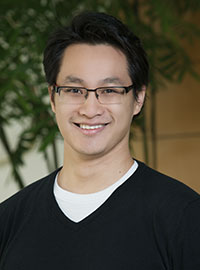
Research Associate
mlfeng [at] med.umich.edu
Mingli Feng graduated from the Georgia Institute of Technology with a Bachelor’s of Science in Biology. Prior to his appointment at the University of Michigan, he worked in the Parkos-Nusrat group at Emory University, in Atlanta, for 2 years. Mingli’s projects involve studying the effects of desmoglein 2 on epithelial cell migration and proliferation. He also studied Wnt Inducible Secreted Protein 1 (WISP1) and its effects on wound restitution and signaling. He is an avid sports and movies fan and likes to play soccer when he’s not in the lab.
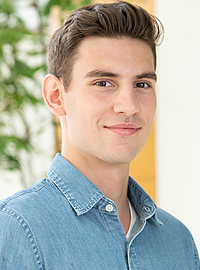
Undergraduate Student
dsfeier [at] med.umich.edu
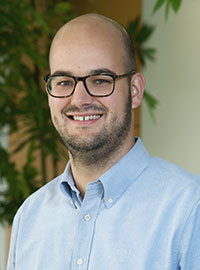
Postdoctoral Research Fellow
svflemmi [at] med.umich.edu
Dr. Sven Flemming is a physician scientist and has a strong interest in leukocyte migration and intestinal barrier properties under inflammatory conditions such as inflammatory bowel diseases. Prior to his appointment in the Parkos lab at the University of Michigan, he worked as a physician scientist in the Department of General Surgery at the University Hospital of Wuerzburg, Germany, and was affiliated with the group of Dr. Nicolas Schlegel. In his previous studies he focused on endothelial barrier disruption caused by pro-inflammatory and/or septic stimuli in-vitro and in-vivo and, secondly, on regulation of epithelial barrier homeostasis in inflammatory bowel diseases and septic conditions. Dr. Flemming currently studies the multistep process of transepithelial migration of leukocytes under inflammatory conditions using intravital microscopy.

Research Investigator
mizuhuo [at] med.umich.edu
Dr. Mizuho Hasegawa has a strong background in molecular biology, immunology, and microbiology. She earned a PhD in Medical Science from Kanazawa University in Japan, studying the molecular signaling of pattern recognition receptors in the host innate immune system. As a postdoctoral fellow in the Inohara/Nuñez lab at the University of Michigan Medical School, her research was seeking to understand several aspects of the host-bacteria interaction at the cellular and molecular level. In 2018, she joined the Parkos/Nusrat lab as a Research Investigator. She is currently interested in mechanisms of intestinal inflammation and mucosal repair, specifically, investigating how the host immunity regulates wound healing and barrier function in the intestine under normal and inflammatory conditions. She is hoping to make significant contributions to help solve fundamental problems of modern medicine and biology.
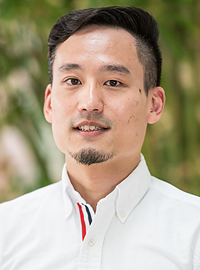
Postdoctoral Research Fellow
shayashi [at] umich.edu
Dr. Shusaku Hayashi obtained his PhD in Pharmaceutical Sciences from Kyoto Pharmaceutical University in Japan, studying the mechanisms of the gastric epithelial restitution after injury. In 2010, he joined the laboratory of Prof. Makoto Kadowaki as an Assistant Professor in the Institute of Natural Medicine at University of Toyama in Japan. Dr. Hayashi’s research has focused on the understanding of IBD pathophysiology using in-vitro and in-vivo experimental models. He is exploring mechanisms of intestinal mucosal repair and ideas that could be developed for therapy of IBD patients. Currently, he is interested in the epithelium-immune cell crosstalk in mucosal homeostasis and wound repair after intestinal inflammation. In 2019, Dr. Hayashi joined Parkos & Nusrat lab as a postdoctoral fellow to understand functions of intestinal epithelial barrier in health and disease with support from JSPS KAKENHI funding.

Research Lab Specialist
rhilgar [at] med.umich.edu
Dr. Roland Hilgarth has expertise in molecular biology, virology, cell biology, and biochemistry. He holds a Ph.D. in Entomology (emphasis in molecular virology) from the University of Kentucky.
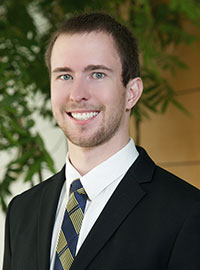
Research Technician General Associate
jkeeney [at] med.umich.edu
Justin Keeney received his Bachelors of Science in Biomolecular Science from the University of Michigan in 2016 and is currently a Research Technician General Associate in the Parkos-Nusrat group. His professional interests have been focused on the study of ingested silver nanoparticles as they travel through the human gastrointestinal tract as well as the study of intestinal epithelial response in regards to wound healing. He currently assists with various projects studying epithelial biology and pathogenesis of mucosal inflammation in the gut. Outside of the lab Justin likes to play sports, cook, and go on adventures, such as mountain biking and white water rafting among other things.
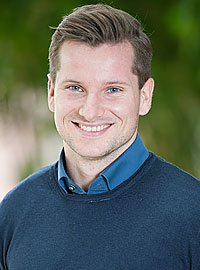
Postdoctoral Research Fellow
mkelm [at] umich.edu
Dr. Matthias Kelm is a physician scientist who received his MD from the Medical University of Graz, Austria, and who has a strong interest in leukocyte migration and intestinal barrier properties under inflammatory conditions such as inflammatory bowel diseases. Prior to his appointment in the Parkos lab at the University of Michigan, he worked as a surgical resident in the Department of General Surgery at the University Hospital of Wuerzburg, Germany, and was affiliated with the research group of Dr. Nicolas Schlegel. Dr. Kelm currently studies the multistep process of transepithelial migration of leukocytes under inflammatory conditions using intravital microscopy and focuses on the role of Lewis glycans during this process.

Postdoctoral Research Fellow
dkusters [at] med.umich.edu
Dr. Dennis Kusters received his PhD in Biochemistry from the University of Maastricht (the Netherlands) in 2015, where his research focused on functions of annexin A1 and A5 in cardiovascular disease. He is currently a postdoctoral research fellow at the University of Michigan, where his professional interests center on intestinal epithelial cell-cell junctions and more particular desmosomes. Current projects include identification of the role of the desmosal cadherins desmoglein-2 and desmocollin-2 in controlling intestinal epithelial barrier function during homeostasis and disease. He obtained the prestigious European Marie-Curie Postdoctoral Fellowship grant to support his research in the Nusrat-Parkos research group. Dennis is author on 12 scientific publications and 1 book chapter.

Laboratory Research Specialist Intermediate
plincoln [at] med.umich.edu
Pamela Lincoln graduated from Michigan State University in 1981 with a Bachelor’s of Science in Medical Technology. Prior to her appointment at the University of Michigan she worked at Michigan State University for 2 years in the Pathology Department studying platelet dysfunction. She went on to work for the Upjohn Corporation for one year and studied lipid biology in the pathology department. She received her LATG certification in 1993 from the University of Michigan. Pamela has worked in the laboratory of Steven Kunkel for the last 32 years and is now jointly appointed with the Parkos-Nusrat labs.
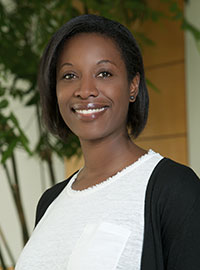
Research Investigator
luissint [at] med.umich.edu
Currently working at Genentech
Dr. Luissint is a junior faculty in the Department of Pathology. She completed her PhD in cell biology from Paris Descartes University (Paris, France) studying the contribution of a Junctional Adhesion Molecule (JAM) family member termed JAM-L in regulating leukocyte transendothelial migration (group of Dr. Sandrine Bourdoulous, Cochin institute, Paris, France). As a Postdoctoral Fellow, she focused on the blood-brain barrier and worked on deciphering molecular mechanisms by which the tight junction protein Claudin-5 regulates permeability of brain microvascular endothelium (group of Dr. Pierre-Olivier Couraud, Cochin Institute, Paris, France). Dr. Luissint joined the labs of Dr. Charles Parkos and Dr. Asma Nusrat as a postdoctoral research fellow at Emory University, then moved to the University of Michigan and, she was appointed as a Research Investigator in March 2019. Dr. Luissint's overall interest is in understanding how intercellular adhesion proteins (primarily Coxsackie and Adenovirus Receptor (CAR)-like membrane Protein (CLMP) and Junctional Adhesion Molecule-A) regulate the intestinal epithelial barrier function, mucosal repair, and the immune response. Dr. Luissint’s work has been published in outstanding peer-reviewed journals such as Nature Communications, J Cell Biol, JCI insight, Mucosal Immunology, Gastroenterology, and Mol Biol Cell. Her major contributions include demonstration of roles for the tight junction protein JAM-A, desmosomal cadherin Desmocollin-2, and CD47 in regulating barrier function, inflammation, and mucosal wound healing, respectively. She was instrumental in helping develop an original in vivo murine model that utilizes a vascularized proximal colonic segment (pcLoop model) to enable quantitative studies of intestinal permeability and leukocyte trafficking across the colonic epithelium in response to chemoattractants. Dr. Luissint is a reviewer for several scientific journals and an Associate faculty member of the “Faculty opinions” where she selects, evaluates, and recommends articles to be considered of major interest to the international scientific community. Dr. Luissint is a member of the American Society of Investigative Pathology (ASIP) and she has received multiple awards including the ASIP Experimental Pathologist-in-training merit Award (2015) and the Muller Trainee Travel Award for Excellence in Inflammation Research (2017). Dr. Luissint enjoys extending her passion for research to younger scientists and is actively involved in training and mentoring graduate students, technicians, and postdoctoral fellows.
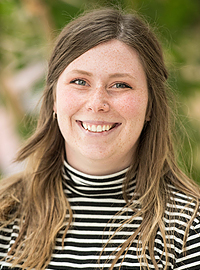
Research Laboratory Technician Associate
renaecat [at] umich.edu
Renae Lyons received a Bachelor of Science in Microbiology from the University of Michigan in 2019 and is currently a Research Technician Associate in the Parkos & Nusrat lab. During her undergraduate studies, she worked in the lab of Dr. Linda Samuelson in the department of Molecular & Integrative Physiology, assisting with the investigation of epithelial homeostasis in the stomach and intestine. She currently assists with various projects studying epithelial biology and wound healing in the gut. When not in the lab, she enjoys playing the oboe, crocheting, and baking.

Research Laboratory Specialist Associate
meenalm [at] med.umich.edu
Meenal completed Master’s in Chemistry from Eastern Michigan University. She won Sigma Xi award for her Master’s thesis at the Graduate Symposium in March, 2008 and her work has been presented at the American Association for Cancer Research meeting in May, 2008. Meenal has expertise in stem cell culture and grows intestinal crypts on 3D and 2D platforms for the lab. She also assists faculty members in experiments related to cell adhesion molecules and intestinal inflammation. Prior to joining Parkos & Nusrat lab she worked at ATCC and was responsible in establishing and characterizing induced pluripotent stem cell lines. She enjoys traveling, reading and watching sports.
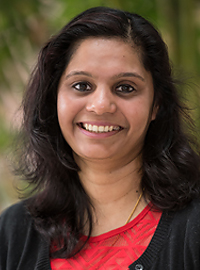
Research Laboratory Specialist Intermediate
kchithra [at] umich.edu
Chithra K. Muraleedharan received her Bachelor’s in Biotechnology Engineering from University of Calicut, India. This degree has helped her to acquire knowledge in various fields namely Microbiology, Molecular Biology, Immunology, and Genetics. To further hone her research experience and learn new laboratory skills, she pursued her Master’s Degree in Biological Sciences from Oakland University. Following her education, she accepted a Research Assistant position at Wayne State University School of Medicine. Her research project mainly focused on the role of microRNA in Pseudomonas-aeruginosa induced keratitis mouse model. As a passionate researcher, she also assisted on an interesting project that highlighted the role of microRNA in diabetic retinopathy. Chithra has over 5 years of research experience with technical expertise in maintaining sterile cell culture lines, performing RT-qPCR, ELISA, in-vitro biochemical assays, Immunofluorescence staining and confocal microscopy. In 2018, she joined the Parkos/Nusrat laboratory as a Research Lab Specialist. Currently, her project involves studying the pathobiology of intestinal barrier function during HIV infection and also to assist in the research project investigating wound healing in the gut.
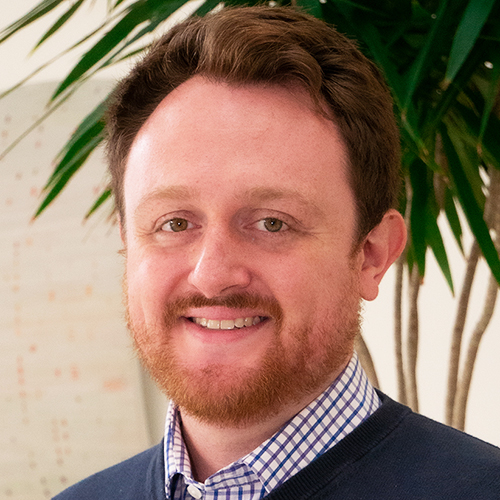
Research Lab Specialist Associate
paob [at] umich.edu
Patrick O’Brien received Bachelor of Science degrees in Biochemistry and Neuroscience from Loyola University Chicago. In his time at Loyola, Patrick earned two fellowships over four years to study non-innocent ligand metal complex synthesis and characterization in Dr. Wei-Tsung Lee’s inorganic chemistry lab. Patrick was also awarded a Social Justice Fellowship to study the application of Postcoloniality to contemporary Mexico with Dr. Héctor García Chávez. After his undergraduate, Patrick spent several years working in behavioral health before taking a position at Michigan State University’s College of Human Medicine. He worked as a Research Technologist under Dr. Sascha Drewlo, studying the effects of drugs and biomarkers on placental mitochondria function. Patrick now serves as a Research Lab Specialist in the Parkos and Nusrat lab performing endothelial and epithelial primary cell culture, in addition to assisting with projects studying wound healing.

Research Investigator
moniqueo [at] med.umich.edu
Dr. Monique O’Leary’s research has integrated studies from mouse models and mammalian cell culture to yeast in order to investigate signaling pathways regulating of gene expression in various disease contexts. Dr. O’Leary received a PhD in Biomedical Science from Baylor College of Medicine in the Department of Molecular and Cellular Biology in the laboratory of Dr. Robert J. Schwartz, studying how transcription factors are regulated to specify tissue lineages in the gastrointestinal tract during mouse embryonic development. As a postdoctoral fellow working in the laboratory of Dr. Brian Kennedy, initially at the University of Washington and subsequently at the Buck Institute for Research on Aging, her research consisted of several projects evaluating compounds in mouse models of age-related disease and progeroid syndromes, and focused on the study of pathways that influence aging and age-related disease progression. Most recently as junior faculty in the Department of Pathology at the University of Michigan, Dr. O’Leary’s research focuses on (1) regulation of mucosal homeostasis and barrier function, including JAM-A complex signaling, and (2) signaling mechanisms mediating wound closure.
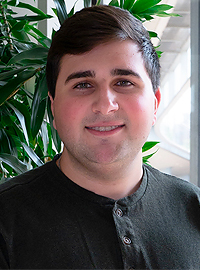
Research Laboratory Tech Assoc
bportell [at] umich.edu
Benjamin received his Bachelor of Science in Neuroscience in 2022 from the University of Michigan. During his undergrad, he became a licensed Emergency Medical Technician and was a first responder on an ambulance road crew. He is currently a Laboratory Research Technician with the Parkos and Nusrat lab and is responsible for genotyping tissue samples, mouse colony maintenance, general lab organization, and assisting other lab members with their research. He is working with our lab to learn more about animal models and further his knowledge of biological experiment techniques. Ben has plans to attend medical school in the future.

Postdoctoral Research Fellow
reedmi [at] med.umich.edu
Dr. Michelle Reed completed her PhD in Immunology at the University of Michigan in December 2014, and joined the Parkos-Nusrat lab group in May 2015. Her interest in mucosal immunopathogenesis led to her thesis work in the lab of Dr. Nicholas W. Lukacs, focused on the interactions between lung epithelial cells and the innate immune system during RSV infection. Her current studies focus on the function of the cell-surface glycoprotein CD47 in intestinal epithelial cells and its potential role in mediating cell proliferation, migration, and wound healing. In addition, she is investigating the mechanism of CD47 cross-link-induced apoptosis in neutrophils and macrophages, and its implications in the resolution of inflammation. She is a member of the American Association of Women in Science, the American Association of Immunologists, and American Association for the Advancement of Science. Originally a native of Salt Lake City, Utah, Michelle loves to hike, mountain bike, and make pottery during her spare time.
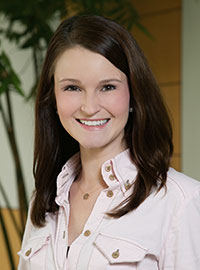
Postdoctoral Research Fellow
dsiuda [at] med.umich.edu
Dr. Dorothée Siuda received her MD from the University of Münster, Germany and is currently a Postdoctoral Research Fellow at the Department of Pathology. Prior to joining the Nusrat lab, she worked at the St. Franziskus-Hospital Münster where she was doing her surgical residency. Her research focuses on intestinal epithelial wound repair during inflammation and her current projects include FPR2 signaling in mucosal wound healing.

Graduate Student
msydneys [at] med.umich.edu
Sydney is a student in the Immunology PhD program who has a strong interest in neutrophil transmigration across the inflamed intestinal epithelium. Sydney graduated from the University of San Diego receiving a Bachelor of Arts degree in Biology and a minor in Chemistry. As an undergraduate Sydney carried out an independent project studying endolysosomal dysfunction in a photoreceptor model of Alzheimer's Disease in Drosophila melanogaster. Currently Sydney is working on understanding the homeostatic role of epithelial tight junction proteins previously implicated in neutrophil transmigration.

Research Laboratory Technician Intermediate
seandw [at] umich.edu
Sean Watson received his Bachelor’s in Science in Neuroscience from Michigan State University. During his time as an undergraduate he worked in the lab of Colleen Hegg investigating the role exogenous cannabinoids on the rate of neurogenesis and gliogenesis in the hippocampus of adolescent and elderly mice. He then worked as a research assistant for Dr. Dohun Pyeon and under the mentorship of Drs. Joseph Henriquez and Albert Dahdah he analyzed the contribution of adrenergic signaling on progression of HPV+ HNSCC as well as the role that CXCL14 on the innervation of the tumor microenvironment. He is currently facilitating administrative maintenance of mouse colonies and participating in ongoing research projects in the Parkos & Nusrat lab.

Graduate Student
mlyulis [at] med.umich.edu
Mark Yulis received a Bachelor of Science in Biochemistry from Muhlenberg College and is currently a Graduate Student at the University of Michigan. His professional interests focus on cadherin signaling mechanisms, apoptosis, and regulation of epithelial homeostasis and his current projects include the relationship between desmosomal cadherin cleavage and epithelial homeostatic signaling.
|
Charles Parkos |
||
|
Name |
Dates in the Lab |
Current Position |
|
Luca Mazzucchelli, MD |
1995-1997 |
Professor, Institute of Pathology, Locarno, Switzerland |
|
Leora Balsam, MD |
1994-1996 |
Associate Professor, Cardiothoracic Surgery, NYU Langone Medical Center, New York, USA |
|
Tony Liang |
1994-1998 |
Associate Scientist, Unity Biotechnology, San Francisco, USA |
|
David L. Jaye, MD |
1998-2007 |
Assistant Professor of Pathology, Emory University, Atlanta, USA |
|
Titus Reaves, PhD |
1998-2004 |
Assistant Professor of Anatomy and Cell Biology, Department of Regenerative Medicine, Medical College of South Carolina, USA |
|
Yuan Liu, PhD |
1998-2004 |
Professor of Biology, Georgia State University, Atlanta, GA |
|
Fred Schnell, PhD |
1998-2001 |
Scientist, Sarepta Therapeutics, Corvallis, Oregon, USA |
|
Heather Edens, PhD |
1999-2003 |
Associate Scientific Director, SciMentum, Atlanta, GA |
|
Ke Zen, PhD |
2000-2005 |
Vice Dean of Life Sciences, Nanjing University, Nanjing China |
|
Andrei Ivanov, PhD |
2002-2007 |
Associate Professor, Virginia Commonwealth University, USA |
|
Kenneth J Mandell, MD PhD |
2002-2005 |
Chief Medical Officer, Noveome Biotherapeutics, USA |
|
Alex Chin, PhD |
2003-2008 |
Director, Clinical Laboratories, University of Calgary, Canada |
|
Winston Lee, MD PhD |
2004-2008 |
Hematopathology Fellow, Brigham and Women’s Hospital/Harvard Medical School, Boston, USA |
|
Eric Severson, MD PhD |
2005-2008 |
Staff Scientist and Hematopathologist, Foundation Medicine, Duram, North Carolina, USA |
|
Rita Jen MD, MPh |
2004-2007 |
Urology Resident, University of Michigan, Ann Arbor, USA |
|
Dominique Weber, PhD |
2005-2015 |
Assistant Professor of Pathology, Emory University, Atlanta, USA |
|
Ingrid McCall, MS |
2006-2009 |
Lab management, Emory University, Atlanta, USA |
|
Abigail Betanzos, PhD |
2006-2008 |
Staff scientist, Center for Research and Advanced Studies of the National Polytechnic Institute, Mexico City, Mexico |
|
Nancy Louis, MD |
2006-2015 |
Neonatologist, Athens Georgia, USA |
|
Eric Peatman, PhD |
2007-2009 |
Associate Professor, School of Fisheries, Aquaculture and Aquatic Sciences, Auburn University, Alabama, USA |
|
Jodi Zuckerman, MD |
2007 |
Otolaryngology, Chicago, USA |
|
Aaron Rogers, MD |
2009 |
Otolaryngology, Atlanta, USA |
|
Ana Monteiro, MD PhD |
2009-2014 |
Internal Medicine Resident, UCLA Medical Center, Los Angeles, USA |
|
Ilke Nalbantoglu, MD |
2009-2010 |
Assistant Professor, Washington University, St. Louis, USA |
|
Manirath Khounlotham, PhD |
2009-2012 |
Postdoctoral Associate, Weill Cornell Medical College, New York, USA |
|
Timothy L. Denning, PhD |
2009-2013 |
Associate Professor, Center for Inflammation, Immunity, & Infection, Georgia State University, Atlanta, USA |
|
Benedicte Fournier, PhD |
2009-2013 |
Pharmacology Paris, France |
|
Wooki Kim, PhD |
2009-2012 |
Assistant Professor, Kyung Hee University, Korea |
|
Ronen Sumagin, PhD |
2009-2014 |
Assistant Professor, Northwestern University, Chicago, USA |
|
Caroline Weight, PhD |
2010-2014 |
Associate Researcher, University College London, UK |
|
Jason Matthews, PhD |
2012-2014 |
Postdoctoral Fellow, Emory University, Atlanta, USA |
|
Holly C. Williams, PhD |
2012-2015 |
Postdoctoral Fellow, Emory University, Atlanta, USA |
|
Anna Lukacher |
2012-2013 |
Juris Doctorate Candidate, University of New Hampshire School of Law, USA |
|
Sarah K. Wise, MD |
2012-2015 |
Associate Professor, Otolaryngology, Emory University, Atlanta, USA |
|
|
|
|
|
Asma Nusrat |
||
|
Name |
Dates in the Lab |
Current Position |
|
Shaun V Walsh, MD |
1998-2001 |
Consultant Pathologist, Lecturer and Director of Training Program, Ninewells Hospitals and Dundee University Medical School, Scotland |
|
Ann Hopkins, PhD |
1999-2004 |
Senior Lecturer and Director of International Electives Program, Royal College of Surgeons in Ireland |
|
Julie J Ha, PhD |
2001-2003 |
Staff Scientist Walter Reed Hospital, Washington DC, USA |
|
Matthias Breuwar, MD |
2001-2003 |
Professor, St. Franziskus-Hospital Munster, Germany |
|
Bridge Tong, PhD |
2001-2004 |
Researcher, Georgia State University, USA |
|
G Thomas Brown, MD PhD |
2001-2005 |
Fellow, Department of Pathology, National Institutes of Health, Washington, USA |
|
Brian Babbin, MD |
2002-2005 |
Medical Director, BioVantra LLC, Florida, USA |
|
Markus Utech, MD |
2003-2005 |
Surgery, Munster, Germany |
|
Zili Wang, PhD |
2004-2006 |
Instructor, Emory University, USA |
|
Elena V Vassilieva PhD |
2004-2007 |
Research Associate, Emory University, USA |
|
Michael Laukoeter, MD |
2005-2007 |
Professor, Munster University, Germany |
|
Stanislav N. Samarin PhD |
2004-2009 |
Strategy and Innovation in Healthcare and Biotechnology, St. Louis, USA |
|
Neal Beeman, PhD |
2008-2010 |
Research Scientist, University of Washington, Department of Bioengineering, Atlanta, USA |
|
Porfirio D. Nava, PhD |
2006-2012 |
Professor, Center for Research and Advanced Studies of the National Polytechnic Institute, Mexico City, Mexico |
|
Keli Kolegraff, MD PhD |
2007-2012 |
Plastic Surgery Resident, Johns Hopkins Hospital, Baltimore, USA |
|
Christopher Capaldo, PhD |
2011-2015 |
Instructor, Cell Biology, Emory University, Atlanta, USA |
|
Stefan Koch, PhD |
2007-2011 |
Faculty, Department of Clinical and Experimental Medicine, Linkoping University, Sweden |
|
Giovanna Leoni, PhD |
2009-2014 |
Research Scientist, Ludwig-Maximilians-University, Munich, Germany |
|
Robert Rankin, PhD |
2009-2014 |
Postdoctoral Fellow, Keck School of Medicine USC, USA |
|
Kun Jiang, MD PhD |
2012-2014 |
Assistant Professor, Pathology, Moffitt Cancer Center, Florida, USA |
|
Attila E Farkas, PhD |
2010-2015 |
Biological Research Center, Hungarian Academy of Sciences, Szeged |
|
Ryuta Kamekura, MD |
2011-2014 |
Department of Human Immunology, Research Institute for Frontier Medicine, Sapporo Medical University, Japan |
|
Ross Hamilton, PhD |
2011-2012 |
Senior Research Scientist at Bionomics Ltd, Adelaide, Australia |
|
Molly McLaughlin |
2009-2010 |
Masters student, Colorado State University, USA |
|
Hikaru Nishio, PhD |
2013-2015 |
Business Strategy and Planning, Aminoscience Division, Ajinomoto Company, Tokyo, Japan. |
|
Benjamin H. Hinrichs MD |
2014-2015 |
Instructor, Pathology, Emory University, Atlanta, USA |